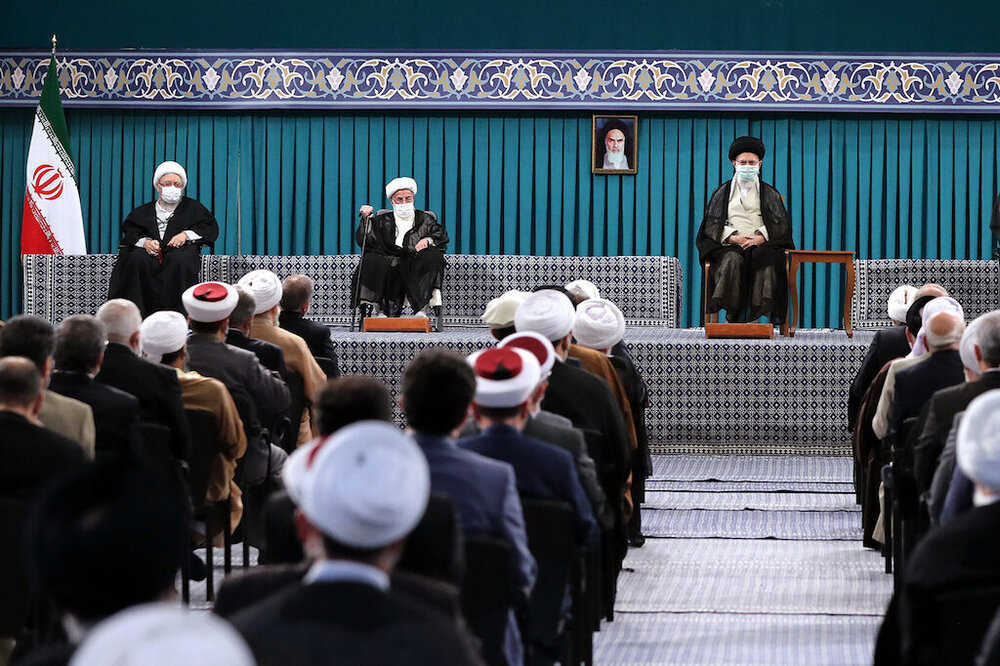Ayatollah Khamenei warns of sectarian dispute fomented by U.S.

TEHRAN – What is the plan of the U.S. after withdrawing its troops from the West Asia region? This question is becoming increasingly important with the U.S.'s gradual withdrawal from a region where it used to maintain considerable military assets and troops on the ground.
With tensions rising around Iran from Afghanistan to Lebanon, Iranian officials are giving a curious and different answer to the aforementioned question that is based on recent developments in a number of countries in the region. The latest reference to the answer can be found in Sunday’s speech delivered by Leader of the Islamic Revolution Ayatollah Seyed Ali Khamenei at a gathering held on the occasion of the birth anniversaries of Prophet Muhammad (PBUH) and Imam Sadiq (PBUH).
Ayatollah Khamenei underlined the need for strengthening unity among all Muslims and warned of the efforts by the U.S. to stoke sectarian tensions among Muslim sects.
The Leader said, “In any period of time, it is the believers’ duty to look at what situation they are in, what the religion expects of them, and what mission has been assigned to them. In this era, acting duly based on Islam's comprehensiveness and the issue of Islamic unity appear to be very important,” according to a read-out published by the khamenei.ir.
“The Islamic Unity is definitely a Quranic obligation. The unity of Muslims is not a tactical matter that some people assume we should be united in certain situations. No, it is a principle. Cooperation between Muslims is necessary. If Muslims are united, they will all be strong,” he said.
The Leader added, “An indicator of Muslim unity is the issue of Palestine. If Muslim unity is realized, the issue of Palestine will be solved in the best way. Some Islamic governments committed a grave sin by normalizing relations with the usurping, despotic Zionist regime. They must repent and compensate.”
Ayatollah Khamenei said the reason for repetitively reiterating the need for unity is the “serious efforts” by the enemies to deepen the schism between Muslim sects. “Today, the words ‘Shia’ and ‘Sunni’ have entered the political language of the Americans while they oppose and are enemy of Islam itself,” he said, noting that the U.S. and its agents are making efforts to create sedition all over the Muslim world.
“The sorrowful and heart-wrenching explosions in Afghanistan’s mosques against the Muslim and worshipping people are a case in point which was carried out by Daesh, and the Americans openly stated that they created Daesh,” the Leader added.
He was referring to recent two explosions targeting mostly Shia Muslim worshippers performing Friday prayers. The Daesh terrorist group claimed responsibility for the deadly attacks, raising alarm bells in Tehran over a possible plot to pitch Afghanistan’s Shia Muslims against the Sunni Taliban and then pitch the Taliban against Tehran.
Iran quickly warned about this plot and increased diplomatic contacts with other Muslim countries and institutions in a bit to prevent an internecine war in Afghanistan, one, that if unleashed, would have severe implications for Tehran and the entire region.
Iranian Foreign Minister Hossein Amir Abdollahian discussed the situation in Afghanistan with his Turkish and Indonesian counterparts as well as Secretary General of the Organization of Islamic Cooperation Yousef Al-Othaimeen.
Amir Abdollahian told the OIC chief that Daesh attacks in Kunduz and Kandahar are aimed to cause sectarian division in Afghanistan.
The Afghanistan attacks coupled with rising tensions in Lebanon and Iraq as well as Azerbaijan created a sense of danger among many Iranians. Some experts and officials in Iran believe that these developments are pieces of one puzzle and that all seek to drive a wedge between Iran and its neighbors in an era marking a decline in U.S. military presence in the West Asia region.
Mohammad Bagher Qalibaf pointed to this Iranian assessment on Sunday at a Tehran conference cherishing Muslim unity. “The Islamic Ummah should know that today global arrogance, led America and the Zionist regime [Israel], seeks to drag Muslims, through sowing division, into fratricide. They seek to sow insecurity in the Muslim world in Afghanistan and elsewhere in the region. Their effort to create division in Lebanon and Iraq and provoke the leaders of the region’s countries are all in this direction,” the parliament speaker said.
Qalibaf underlined that U.S. troops superficially left the region but their work is still unfinished.
But while the U.S. is bet on the leaders of some Muslim countries in order to secure its interests by pitching them against Tehran, Iran is carefully extending its hands to the people in the region in an effort to beef up unity among Muslims. At the end of the day, Iran is a Muslim country and Muslims are the natural allies of Iran.
Leave a Comment